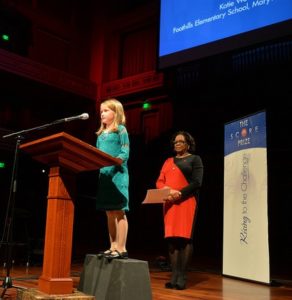We talk a lot about numbers in education reform. Standardized test scores, value-added assessments, rankings. And while research, statistics, and outcomes are all vital, we can’t lose sight of why all of this work matters in the first place: Tennessee students. Consequently, it is important to understand that behind every number is a student whose voice demands to be heard. In the midst of these data-driven reforms, it is this student voice that still matters the most.

I recently had the opportunity to read and view each of the 128 student entries to this year’s SCORE Students Rise to the Challenge Competition. Although the competition has now ended and the winners have been selected (congratulations to Katie Workman, Vincent Gould, and Spencer Beckman), each and every one of these students had something important to say about their own education that stuck with me.
Students in grades 3-12 demonstrated how they used math skills to make purchases, bake cakes, and do photography. They used English skills to analyze pop song lyrics and make persuasive arguments to their parents. They were creative, witty, and above all, intelligent. With the right instruction from their teachers and support from their schools, these students successfully recognized how learning goes beyond the classroom.
Students like these are the reason that a classroom curriculum grounded in the high academic standards is so vital. Tennessee’s academic standards, in determining the knowledge and skills that students are expected to learn in each grade and subject, ensure that students are prepared for their lives beyond the classroom—in colleges and in their careers.
With these rigorous standards, the focus of learning is on critical thinking, problem solving, and the real-world application of skills. By encouraging students to find, prove, and explain their answers, these standards foster a skillset that enables students to use their knowledge in a meaningful way. With the structure of high standards and the assessments aligned to them driving classroom learning, the adage “When will I ever use this in real life?” can become obsolete.
We know that data is important. Assessments are necessary to track student progress, and quantitative results show schools how and where they need to improve. But the numbers are simply a means to an end: preparing capable students who can “rise to the challenge” outside the classroom.
By grounding learning in a foundation of high standards that emphasize critical thinking and problem solving skills, we are equipping students to do just that. Ultimately, when we hand students the right tools, we ensure not only that they have a voice, but that they know how to use it. Now, all we have to do is listen.
